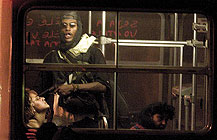|
|
|
|
Bus
174
|
 |
|
This outstanding documentary dissects a tragic event in recent Brazilian history. In June 2000, a disturbed street kid named Sandro do Nascimento hijacked a bus and held its occupants hostage. Like a number of recent documentaries that are as much about the media coverage of specific events as about the events themselves (for example, Guerrilla: The Taking of Patty Hearst , 2004), Bus 174 restricts itself largely to what the television cameras stationed outside the vehicle recorded on that fateful day. There is no shortage of footage to pick from. With a certain irony, director Josť Padilha has so many angles at his disposal, so much coverage (as is said in the film industry), that it is a breeze for him to construct breathless montage sequences that rival any blockbuster Hollywood action movie. He is also able to effortlessly trace and dissect the tragi-comedy of the confused police response to events as they unfolded and agonisingly dragged on. Yet we also gradually become aware of a poignant absence. Since no camera or microphone got inside that bus, we will never truly know what the hostage said to his victims, or see the small signs and gestures that could have revealed his true state of mind. Sandro, although he appeared as a larger-than-life urban gangster on the news, remains a blank, a mystery. That is the true starting point for this rigorously constructed film. Padilha takes us behind the stereotype of the crazed street kid making a violent grab for thrills or cash. He investigates the enigma of Sandro by interviewing the surviving hostages, and everyone who was involved directly with the kidnapper – social workers, family members, friends once or still in the street gangs. A shocking and sobering portrait emerges. Every time that Sandro, at the bus window, hurls an obscure reference to a person or event, Padilha takes a break from the action to fill in the background. We learn of the childhood trauma endured by Sandro and so many like him. We learn about the moments when, with encouragement, he seemed to be about to break the cycle of poverty and crime. We discover how often he fell back into drug-taking and theft. At this level, the film is a remarkable sociological document. When Sandro boarded that bus, his action was, from one angle, desperate, suicidal, probably fuelled by a cocaine high. But from another angle it was perfectly well calculated. Sandro, in that gesture, tore away the cloak of social invisibility and anonymity. Suddenly he had a face, a name and a voice – and he wielded power. In another especially delicious and cutting irony, Padilha compares Sandro's drive to be seen with the behaviour of various characters who, still today, do not wish to be identified on camera. The film takes what has become a curse on documentary filmmakers – the right for individuals to have their image or voice digitally altered – and turns it into a form of social commentary. Tellingly, on both sides of the law, both a cop and a gangster choose to give studio interviews with their faces fully covered by masks. Bus 174 is an utterly engrossing film that lends substance to fashionable claims that documentary deserves as much attention from cinema audiences as fiction traditionally enjoys. More politically meaningful than Touching the Void (2003), less flashy and jokey than Fahrenheit 9/11 (2004), it rates among the highlights of its year. © Adrian Martin July 2004 |
![]()